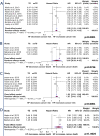Cancer incidence and mortality in patients diagnosed with heart failure: results from an updated systematic review and meta-analysis
- PMID: 36698216
- PMCID: PMC9875493
- DOI: 10.1186/s40959-023-00158-1
Cancer incidence and mortality in patients diagnosed with heart failure: results from an updated systematic review and meta-analysis
Abstract
Background: Several cohort studies aimed at demonstrating an increased risk of cancer incidence and mortality in patients with a pre-existing diagnosis of heart failure (HF); however, conflicting results have been reported that call for systematic review and meta-analysis.
Methods: We conducted a systematic search of multiple databases from their inception through July 2022 and retrieved only papers reporting hazard ratios (HR). Random and fixed-effects models were fit for the study duration.
Results: The analysis included nine cohort studies for a total of 515'041 HF cases and 1'365'452 controls without HF. Although high heterogeneity among studies was observed, the HR for incident cancer in HF patients was statistically significant (1.45, 95% CI 1.31-1.61, p < 0.0001), which was confirmed by sensitivity analyses; however, by analyzing the few papers reporting HRs for cancer mortality, no significant difference between HF and non-HF patients could be detected (HR 2.03, 95% CI [0.93-4.43], p = 0.0736). Further scrutiny of studies with adjusted HRs, when available, confirmed that cancer incidence was significantly increased in patients with HF, as was cancer mortality as well.
Conclusions: This meta-analysis shows that HF patients are at an increased risk of incident cancer. Increased mortality could not be firmly demonstrated by the available data. Our results call for inclusion of cancer-related endpoints in HF trials to adequately address this important clinical issue.
Keywords: Cancer incidence; Cancer mortality; Cardio-oncology; Heart failure; Meta-analysis; Systematic review.
© 2023. The Author(s).
Conflict of interest statement
The authors declare that they have no competing interests.
Figures



Similar articles
-
The association between pre-existing heart failure and cancer incidence: A systematic review and meta-analysis.Rev Port Cardiol. 2024 Jul;43(7):399-414. doi: 10.1016/j.repc.2023.10.015. Epub 2024 Apr 6. Rev Port Cardiol. 2024. PMID: 38583859 English, Portuguese.
-
Does heart failure increase the risk of incident cancer? A meta-analysis and systematic review.Heart Fail Rev. 2020 Nov;25(6):949-955. doi: 10.1007/s10741-019-09876-0. Heart Fail Rev. 2020. PMID: 31745841
-
Association between heart failure and the incidence of cancer: a systematic review and meta-analysis.Eur Heart J Open. 2023 Aug 3;3(5):oead073. doi: 10.1093/ehjopen/oead073. eCollection 2023 Sep. Eur Heart J Open. 2023. PMID: 37818223 Free PMC article.
-
Community-based care for the specialized management of heart failure: an evidence-based analysis.Ont Health Technol Assess Ser. 2009;9(17):1-42. Epub 2009 Nov 1. Ont Health Technol Assess Ser. 2009. PMID: 23074521 Free PMC article.
-
Cancer Incidence and Mortality According to Pre-Existing Heart Failure in a Community-Based Cohort.JACC CardioOncol. 2022 Jan 18;4(1):98-109. doi: 10.1016/j.jaccao.2021.11.007. eCollection 2022 Mar. JACC CardioOncol. 2022. PMID: 35492831 Free PMC article.
Cited by
-
Impact of breast cancer on in-hospital mortality and health care utilization in female heart failure patients: a retrospective cohort study.Proc (Bayl Univ Med Cent). 2024 Jul 1;37(5):794-801. doi: 10.1080/08998280.2024.2364166. eCollection 2024. Proc (Bayl Univ Med Cent). 2024. PMID: 39165821 Free PMC article.
-
Cancer as an Individual Risk Factor for Heart Failure: A Review of Literature.Cureus. 2024 May 19;16(5):e60592. doi: 10.7759/cureus.60592. eCollection 2024 May. Cureus. 2024. PMID: 38894762 Free PMC article. Review.
-
Cancer and Heart Failure: Dangerous Liaisons.J Cardiovasc Dev Dis. 2024 Aug 27;11(9):263. doi: 10.3390/jcdd11090263. J Cardiovasc Dev Dis. 2024. PMID: 39330321 Free PMC article. Review.
-
Heart failure pharmacotherapy and cancer: pathways and pre-clinical/clinical evidence.Eur Heart J. 2024 Apr 7;45(14):1224-1240. doi: 10.1093/eurheartj/ehae105. Eur Heart J. 2024. PMID: 38441940 Free PMC article. Review.
-
Cancer Development and Progression in Patients with Heart Failure.Curr Heart Fail Rep. 2024 Dec;21(6):515-529. doi: 10.1007/s11897-024-00680-y. Epub 2024 Sep 28. Curr Heart Fail Rep. 2024. PMID: 39340596 Free PMC article. Review.
References
-
- de Boer RA, Hulot JS, Tocchetti CG, Aboumsallem JP, Ameri P, Anker SD, et al. Common mechanistic pathways in cancer and heart failure. A scientific roadmap on behalf of the translational research Committee of the Heart Failure Association (HFA) of the European Society of Cardiology (ESC) Eur J Heart Fail. 2020;22:2272–2289. doi: 10.1002/ejhf.2029. - DOI - PMC - PubMed
-
- Tocchetti CG, Ameri P, de Boer RA, D'Alessandra Y, Russo M, Sorriento D, et al. Cardiac dysfunction in cancer patients: beyond direct cardiomyocyte damage of anticancer drugs: novel cardio-oncology insights from the joint 2019 meeting of the ESC working groups of myocardial function and cellular biology of the heart. Cardiovasc Res. 2020;116:1820–1834. doi: 10.1093/cvr/cvaa222. - DOI - PubMed
-
- Lyon AR, López-Fernández T, Couch LS, Asteggiano R, Aznar MC, Bergler-Klein J, et al. 2022 ESC guidelines on cardio-oncology developed in collaboration with the European Hematology Association (EHA), the European Society for Therapeutic Radiology and Oncology (ESTRO) and the international cardio-oncology society (IC-OS) Eur Heart J. 2022;43:4229–4361. doi: 10.1093/eurheartj/ehac244. - DOI - PubMed
LinkOut - more resources
Full Text Sources
Research Materials
Miscellaneous
